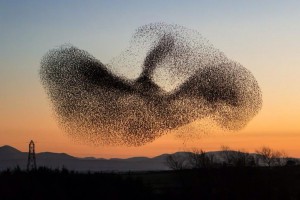Today is, along with Veteran’s Day, and Remembrance Day, and Armistice Day, also St. Martin’s Day, that is, the Feast of St. Martin of Tour. It is Martinmas, which in many places marked the end of the harvest.
St. Martin is also patron of infantrymen.
I once held the skull of St. Martin in my hands during a visit to Tours. But that’s another story.
Here is, for your poetic pleasure, …
“Martinmass” by John Clare written on 11 Nov 1841.
‘Tis Martinmass from rig to rig
Ploughed fields and meadow lands are blea
In hedge and field each restless twig
Is dancing on the naked tree
Flags in the dykes are bleached and brown
Docks by its sides are dry and dead
All but the ivy-boughs are brown
Upon each leaning dotterel’s headCrimsoned with awes the awthorns bend
O’er meadow-dykes and rising floods
The wild geese seek the reedy fen
And dark the storm comes o’er the woods
The crowds of lapwings load the air
With buzes of a thousand wings
There flocks of starnels too repair
When morning o’er the valley springs
I would love to hear this read by someone with a Northhamptonshire accent.
BTW… starnels are starlings, which group together in great “mumurations”.
You can see these each year over Rome as they migrate. Recently, I’ve spotted some smaller groups around Madison.



































From lauds in the Breviarium Romanum: “Ecce sacérdos magnus, qui in diébus suis plácuit Deo, et invéntus est iustus: et in témpore iracúndiæ factus est reconciliátio” (Ecclus. 44:16-17). St. Martin wonderfully exemplified the mission of Mother Church, to reconcile man with God. May his intercession obtain for us the strength to carry on doing the same in the face of so many factions. Thank you, Lord God, for raising up so many varied examples of holy men and women for us to follow for those times when we lose sight of the fact that Jesus is the pioneer of our faith, due to our human frailty … “Et dicebat ad Jesum : Domine, memento mei cum veneris in regnum tuum” (secundum Lucam 23:42).
A poem by Thomas Hood about November:
http://www.poemhunter.com/poem/november-2/
From less erudite ancestors:
“It is the day of Martilmasse
Cuppes of ale should freelie pass.”
Spelling challenged, but I can happily get behind the sentiment.
I’ve had the privilege of a one-night stay at Saint-Martin de Ligugé, the oldest Monastery in Western Europe, that St Martin founded, and where François Rabelais was also a Monk, on my Way to Compostela and unknown to me at the time towards my Conversion.
Not even deliberately, I stumbled upon the Monastery by “chance”, not design, at least not my design, having spent the previous night outside with my sleeping bag and an annoyingly friendly hedgehog (gently freeing a rolled-up one from his personal relationship with your woollen jumper at 3 AM is an interesting 20 minutes), and the clear-minded welcome of the Monks for a lost Pilgrim, obviously not Catholic, attribution of a Cell for the night, cleansing of the hands (and my soul) with water prior to wonderfully simple dinner in the Refectory, the extraordinarily beautiful Vespers as a brother with them, all of these are as dear to my memory as they were helpful towards my Conversion.
God Bless the Brother Monks of dear Saint Martin !!!
Here’s an old Irish song Matinmas Time: https://www.youtube.com/watch?v=aQGjwK4VYVY
Well, I liked the poem and I read it out loud…not with a Northamptonshire accent but with my own Yorkshire accent. Will that do? (Iam constantly told of my accent even though I live in Australia)
Around here the day is called Mårtengås. Mårten = a more peasant-y form of Martin, gås = goose. Å is pronounced awe. You’re supposed to have goose for dinner.
Father, perhaps you would be so kind as to tell us that story. Last year on this day, I was in Tours for the feast and the beginning of a local Jubilee year. 1700th anniv. of his birth.
And, successfully having submitted a comment for your perusal, may I add, God bless you and your apostolic works.
John Clare’s book of poems, Poems Descriptive of Rural Life and Scenery can be read at the InternetArchive. Read, especially, the introduction. Our harvest was indeed finished up today; another 100# of potatoes.
“People don’t notice whether it is winter or summer when they are happy” – Chekhov.
Please take a moment to pray for John Clare and Anton Chekhov. They do not need your prayers anymore or any less, I guess, than the billions of now anonymous people who were alive at the same time as they were – but you have now enjoyed, at a distance of course, what they said – and prayers for their souls will make you and them happier.
November is my favorite month next to December, by the way, just like Friday is my favorite day that is not a weekend day (four decades of brutal 40 hour work-weeks have taught me that truth).
[I enjoyed that comment from top to bottom.]
I happened to be listening to a lecture about Martin Luther on Thursday night (10 Nov), and was surprised at the coincidence that he had in fact been born on 10 Nov and baptised the very next day–which is perhaps why he was named Martin, after St Martin of Tours.
The poem doesn’t sound too bad in a Staffordshire accent either, especially with the dropped “h” in awes and awthorns. For the sake of consistency I had to go back to the beginning and read “in edge and field” and “dotterel’s ead.”
Verse 2 brings to mind a truly wondrous palindrome. Do geese see God?